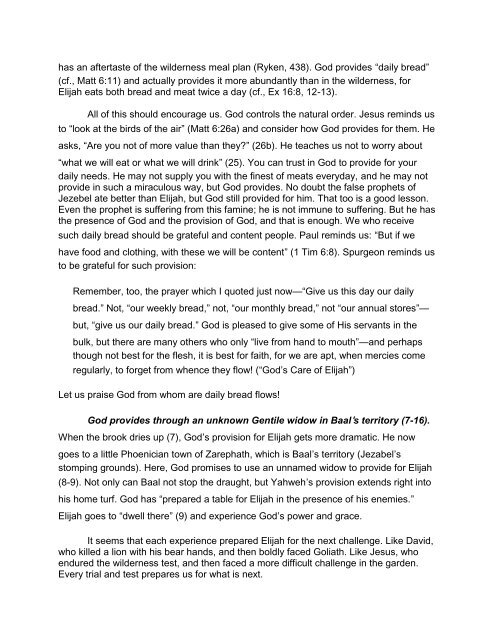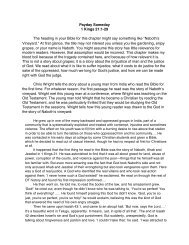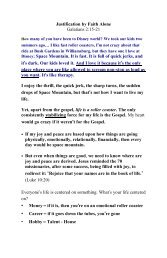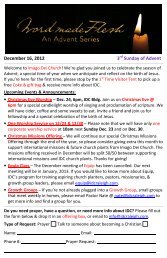Download the sermon notes
Download the sermon notes
Download the sermon notes
Create successful ePaper yourself
Turn your PDF publications into a flip-book with our unique Google optimized e-Paper software.
has an aftertaste of <strong>the</strong> wilderness meal plan (Ryken, 438). God provides “daily bread”<br />
(cf., Matt 6:11) and actually provides it more abundantly than in <strong>the</strong> wilderness, for<br />
Elijah eats both bread and meat twice a day (cf., Ex 16:8, 12-13).<br />
All of this should encourage us. God controls <strong>the</strong> natural order. Jesus reminds us<br />
to “look at <strong>the</strong> birds of <strong>the</strong> air” (Matt 6:26a) and consider how God provides for <strong>the</strong>m. He<br />
asks, “Are you not of more value than <strong>the</strong>y?” (26b). He teaches us not to worry about<br />
“what we will eat or what we will drink” (25). You can trust in God to provide for your<br />
daily needs. He may not supply you with <strong>the</strong> finest of meats everyday, and he may not<br />
provide in such a miraculous way, but God provides. No doubt <strong>the</strong> false prophets of<br />
Jezebel ate better than Elijah, but God still provided for him. That too is a good lesson.<br />
Even <strong>the</strong> prophet is suffering from this famine; he is not immune to suffering. But he has<br />
<strong>the</strong> presence of God and <strong>the</strong> provision of God, and that is enough. We who receive<br />
such daily bread should be grateful and content people. Paul reminds us: “But if we<br />
have food and clothing, with <strong>the</strong>se we will be content” (1 Tim 6:8). Spurgeon reminds us<br />
to be grateful for such provision:<br />
Remember, too, <strong>the</strong> prayer which I quoted just now—“Give us this day our daily<br />
bread.” Not, “our weekly bread,” not, “our monthly bread,” not “our annual stores”—<br />
but, “give us our daily bread.” God is pleased to give some of His servants in <strong>the</strong><br />
bulk, but <strong>the</strong>re are many o<strong>the</strong>rs who only “live from hand to mouth”—and perhaps<br />
though not best for <strong>the</strong> flesh, it is best for faith, for we are apt, when mercies come<br />
regularly, to forget from whence <strong>the</strong>y flow! (“God’s Care of Elijah”)<br />
Let us praise God from whom are daily bread flows!<br />
God provides through an unknown Gentile widow in Baal’s territory (7-16).<br />
When <strong>the</strong> brook dries up (7), God’s provision for Elijah gets more dramatic. He now<br />
goes to a little Phoenician town of Zarephath, which is Baal’s territory (Jezabel’s<br />
stomping grounds). Here, God promises to use an unnamed widow to provide for Elijah<br />
(8-9). Not only can Baal not stop <strong>the</strong> draught, but Yahweh’s provision extends right into<br />
his home turf. God has “prepared a table for Elijah in <strong>the</strong> presence of his enemies.”<br />
Elijah goes to “dwell <strong>the</strong>re” (9) and experience God’s power and grace.<br />
It seems that each experience prepared Elijah for <strong>the</strong> next challenge. Like David,<br />
who killed a lion with his bear hands, and <strong>the</strong>n boldly faced Goliath. Like Jesus, who<br />
endured <strong>the</strong> wilderness test, and <strong>the</strong>n faced a more difficult challenge in <strong>the</strong> garden.<br />
Every trial and test prepares us for what is next.







